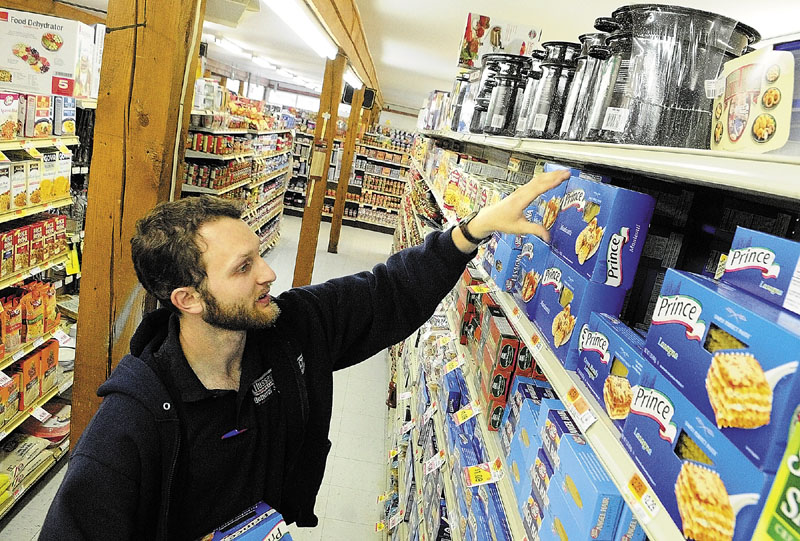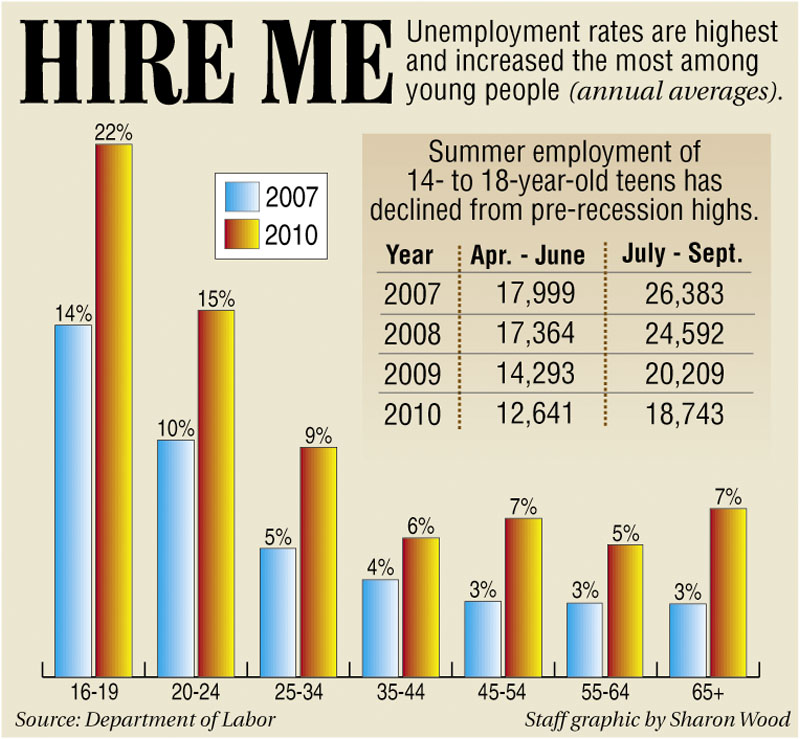AUGUSTA — Brittany Ford started looking for a summer job long before the warm weather arrived.
“I was crazy looking for jobs,” said Ford, 20, an Augusta resident entering her junior year at Stonehill College in Easton, Mass. “I started at school, looking for something on campus, but as soon as the jobs were posted they were gone. I feel that people are just scrambling for jobs this summer.”
Ford needs the money for daily expenses and tuition at Stonehill. So she jumped at an opportunity presented by a friend of her mother: Each Saturday, Ford and her friend Kaitlyn Marks, an 18-year-old graduate of Cony High School, head to Boothbay for an eight-hour day of cleaning rental cabins.
Ford and Marks aren’t alone. Competition from adult workers and shifting seasonal employment patterns have students looking for summer jobs finding much less opportunity for them than just a few years ago.
Unemployment rates for Maine workers ages 16 to 24 were 50 percent higher in 2010 than 2007, and 29 percent fewer teens 14 to 18 worked last summer than in the summer of 2007, according to data from the Maine Department of Labor.
No figures are yet available for this year. Maine’s overall unemployment rate is down slightly from 2010, but federal stimulus-supported programs that provided summer jobs to youth the last two summers aren’t available this year.
Summer jobs do more than provide pocket change, especially for college students who need to save for tuition or textbooks. A summer job can also lay a foundation for a teen’s future in the work force.
“Early work experiences make a difference, and it comes down to skills and experience,” said Adam Fisher, spokesman for the Maine Department of Labor. “Young people who have had jobs as teenagers tend to have lower unemployment rates in their 20s.”
Older workers wanted
Thousands of Mainers who have lost their jobs or had hours cut during the recession have turned to the retail and food service jobs where teens have traditionally worked.
Older workers have advantages, employers say, including being more mature and responsible, having skills acquired at previous jobs and being able to do jobs, such as those serving alcohol, with age restrictions.
Those are some of the reasons why Sparetime Recreation manager Donna Bowden typically doesn’t hire teens.
“There tends to be a lot more supervision and a lot more guidance that you need to have. They haven’t developed a work ethic yet,” Bowden said. “I wish we could hire more young people just to give them that opportunity.”
Schedules also get in the way, especially before school lets out or after students return to classes.
“Years ago, the tourism season fit very well with young workers who were on summer break,” Fisher said. “Nowadays, they can’t rely on teenagers because the season has gone longer. It used to run between Memorial Day and Labor Day. Now June is not necessarily one of the busier months anymore. It goes into September and October.”
In spite of these changes, Maine’s strong seasonal economy probably does provide young workers with more opportunities than they might have in other states, Fisher said.
The capital area, however, doesn’t have as many seasonal businesses as other parts of the state do, noted Deanna Coutts, the youth service coordinator at Augusta Career Center.
Coutts helped place 92 Kennebec County youths in jobs last summer and 146 in the summer of 2009. They did typical entry-level jobs in fields including landscaping and child care, as well as public service projects like maintaining a community garden.
The jobs were part of a summer youth employment program that paid the workers’ wages with federal stimulus funds. But now that money has dried up.
Until the late 1990s, the federal government regularly funded summer youth employment through legislation such as the Job Training Partnership Act, which assisted economically disadvantaged people under age 22.
“We put almost 400 kids to work,” Coutts said. “The economy was so great at one point they took it away and felt that kids could get their own jobs, I guess.”
Summer help needed
Although the summer tourist season isn’t as robust in the capital area as other areas of Maine, there are businesses that rely on students on summer break to get them through the busy months.
“We definitely are a seasonal business,” said Gary Strout, manager of Hussey’s General Store in Windsor. “It really helps out a lot.”
Strout also wants to help the next generation. He got started in the grocery business as a cooler boy at Cumberland Farms when he was 12. Too young to be on the payroll, he was compensated with soda and chips until he was old enough to be hired for a real job there.
“I’ve been a store manager most of my life, so I guess it worked,” he said.
Jen Kruk, owner of Deb’s Ice Cream and Mini Golf in Randolph, hires students almost exclusively. Few adults apply for the minimum-wage jobs, which are available April through October.
“I think it’s a good starting job,” she said. “You learn what it’s like to have a real job.”
Kruk likes to hire younger teens who will return for four or five summers. This year she got about 30 applicants, as is typical, but had fewer vacancies to fill — only two — because most of last year’s crew came back.
Strout said there have been lots of people looking for work at Hussey’s.
“I’ll bet you I get 10 calls a day from high school kids that need a job, want a job, and I’m all booked up,” he said.
Jonathan Pelton, 20, had an advantage because he’s already worked at Hussey’s for two summers. He also managed to get his younger sister Emily, 18, at job at Hussey’s this year.
“I feel very fortunate,” said the South China resident, who attends Pensacola Christian College in Florida. “I got in here right before the job market really started to collapse.”
Pelton does a little bit of everything — stocking shelves, running a cash register, cleaning or pumping gas. It doesn’t relate much to his studies in mechanical engineering, but he doesn’t mind, especially when he sees friends and relatives struggle to find anything.
“Not a lot of people have jobs, so you take what you can,” he said.
‘Wake-up call’
With July here already, students still looking for a summer job will probably find it more difficult than ever.
“I like to do my hiring early,” Kruk said. “A lot of times the people who apply wait until school is out, which can be a little late.”
But vacancies do come up, and not applying for a job is a sure way of not getting one. To that end, Strout recommends a proactive approach.
“I’ve always believed in walking the streets,” he said. “You have to go and bang on doors. A resume in a box doesn’t do anything. Go talk to a manager.”
Although she can’t go out and get someone a job, Coutts has advice for young people who may be despairing from filling out application after application.
“I try to keep them positive,” she said. “I try to offer suggestions of things they can do.”
If a job in a store or restaurant isn’t available, she said, teens can market their services to neighbors and other people they know, offering to do yard work or babysitting, for example.
Even if they can’t find paying work, Coutts said, young people should find something productive to do, such as volunteering. Volunteer work can teach important skills and, along with school activities, looks good on a resume for future summers.
A few years ago, Coutts arranged for a girl to help clean art classrooms in Augusta schools during the summer.
“She got some skills and was able to take that experience, as well as meeting some people in the school department, and now she does substitute teaching work,” Coutts said.
Ford and Marks, on the other hand, say their work cleaning cottages is something they hope not to continue as adults. It’s been only a few Saturdays so far, but they’ve been exhausting.
“It’s a wake-up call,” said Marks, who also works at Olympia Sports and will attend East Carolina University in the fall. “It’s a lot more demanding. I’ve never had a hard-labor job. It’s different from handling clean merchandise. You’re on your knees scrubbing toilets.”
She and Ford aren’t complaining, though. It’s a job, after all.
“We don’t have the luxury of choosing where to work,” Ford said.
Susan McMillan — 621-5645
smcmillan@mainetoday.com
Send questions/comments to the editors.




Comments are no longer available on this story